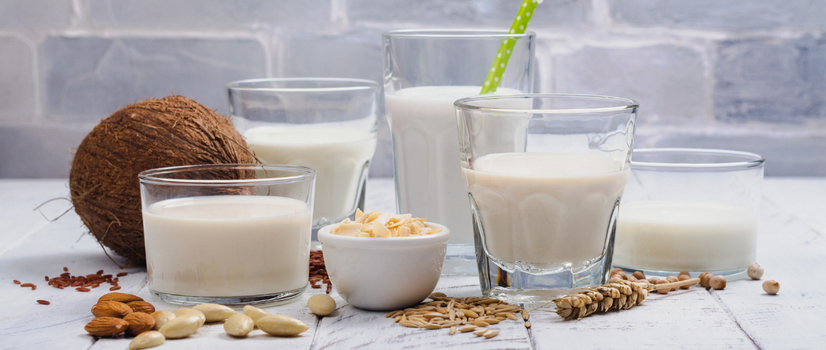
The top ten questions we get asked about plant milks answered
Navigating the rapidly growing plant-based milk aisle at the supermarket can be overwhelming, making it hard to know which plant-based milk is right for you.
No matter the reason that has landed you in the plant-based milk aisle, whether that be an allergy or intolerance, taste preference or you are just curious to try something new, there is a lot to consider when making your decision.
Sanitarium dietitian Nicola Perry answers some of your most popular questions about plant milks to help you find the best plant milk for you and your family.
1. What is plant-based milk?
Plant-based milks are a dairy-free alternative to cow's milk. They can be a healthy choice for people of all ages. With so many options to choose from - like soy, almond, rice, coconut, or oat milk – there’s definitely a plant-milk that’s right for you.
2. Is plant-based milk good for you?
Absolutely! Plant-based milks are a great option and can be part of a healthy balanced diet. While fortified soy milk is the closest match to cow's milk in terms of protein and nutrients, each plant-based milk offers its own unique benefits.
Almond milk, for example, has a light texture and contains the antioxidant vitamin E from the almonds. Oat milk is versatile and great for both drinking and baking. Coconut milk is light and sweet and is perfect for cooking and drinking.
Whichever flavour you choose, we recommend you pick one that has been fortified. The fortification process adds nutrients like calcium to support strong bones, vitamin B12 to help reduce tiredness and fatigue, and to support your immune system.
3. Which plant-based milk is the best for me?
Everyone has different needs and tastes and there’s no one-size-fits-all option. If you rely on milk to count towards your daily protein, calcium, or vitamin B12 intake, you might benefit from choosing a plant-based milk that’s higher in these nutrients. Ultimately, the right choice depends on your personal taste, health needs, nutritional goals, age, and any allergies or intolerances you may have.
4. Why do people drink plant-based milk?
Some people have an intolerance to lactose – the sugar in dairy – which can cause bloating, pain, and diarrhoea when they drink cow’s milk or eat dairy products. For them, plant-based milk provides a tasty and versatile lactose-free alternative.
A growing number of people are also choosing plant-based milk for ethical reasons. For example, research from New Zealand found that plant milk and plant-based diets tend to generate lower greenhouse gas emissions. It’s eco-friendly as it uses less water, land, and energy compared to dairy milk. Plus, it generates lower greenhouse gas emissions and reduces deforestation, making it a more sustainable choice as it uses less water, land, and energy compared to dairy milk production. Plus, studies show it generates lower greenhouse gas emissions and reduces deforestation, making it a more sustainable choice.
Others just simply prefer plant-based milk because they enjoy the taste, finding it a delicious addition to their diet.
5. Will swapping to plant-based milks help with my bloating?
Bloating can be caused by a number of reasons – some bloating after eating is even normal! However, if you are feeling digestive discomfort, it is a good idea to chat to your healthcare provider or dietitian to help figure out the root cause.
If your tummy troubles are due to lactose intolerance or a milk allergy, then choosing plant-based milks, which are naturally lactose and dairy free, could be a great option to try. Some plant-based milks, including Sanitarium’s So Good™ Soy Milk, are also low FODMAP – check the packaging to see whether it is low FODMAP certified.
6. What should I look for when buying plant milks?
As a dietician, I recommend people check the label and choose an option with at least 100mg of calcium per 100mL, and make sure the milk is fortified with vitamin B2 and vitamin B12, which is recommended in the New Zealand dietary guidelines. These nutrients are important for bone health and overall wellbeing.
Understanding and reading food labels and ingredient lists can also help you choose the best milk by allowing you to compare energy, fat, protein, and other key nutrients. These labels can help support your nutritional goals, energy levels, and overall health management.
7. Can I give plant milks to my kids?
Yes, you can definitely give plant-based milks to your kids, but choosing the right one is important. Babies can start having small amounts of full fat soy milk from 7 months old, and then can drink full fat soy as a complete dairy milk alternative from 1 years old as it is typically high in protein and fortified with essential nutrients like calcium, vitamin B2 and vitamin B12. While almond and oat milks aren't suitable as a complete milk replacement for children under age five due to their lower protein content and different nutrient profiles, they can still be included as an addition to other protein rich foods and beverages/milks.
We recommend you consult your GP or dietitian before making any changes to your child's diet to ensure they are meeting all their nutritional needs.
8. Does plant milk have calcium?
Yes, most of the top-selling plant-based milks are fortified with calcium, with many also fortified with other important nutrients like vitamins B2, B12, D and A. To make sure you’re getting enough calcium, the New Zealand dietary guidelines I recommend choosing plant-based milks that offer at least 100mg of calcium per 100ml. Look at the nutrition information panel on the back of the pack to make sure it meets this.
Research shows that calcium absorption from cow’s milk is similar to that from calcium-fortified plant milks like soy milk. The vitamin D added to some plant-based milks also helps with calcium absorption. You can also include other calcium containing foods in your diet, like calcium-fortified cereals, calcium-set tofu, soybeans, almonds, figs, and leafy green vegetables. For a host of recipe ideas click here.
9. Do milk alternatives taste like milk?
Plant-based milks each have their own unique flavours. Soy milk, has a creamy texture and slightly nutty flavour, almond milk has a smooth, nutty taste, while oat milk is often considered the most reminiscent of dairy when it comes to taste and texture, particularly when consumed in hot beverages.
10. What is your favourite plant milk?
Personally, I love using almond milk in smoothies for its nutty flavour, oat milk in my hot drinks for its creamy texture, and soy milk in my cereal as I find the slightly thicker consistency helps the cereal stay crispier longer.
With their wide range of delicious flavours, plant-based milks offer a satisfying and tasty alternative to traditional dairy. There’s something for everyone, and with so many options, it’s easy to find a favourite.
Check out our collection of recipes for delicious ideas on how to use plant-based milk, including the best combinations for smoothies and more!

The latest nutrition advice, plus health and wellness tips delivered to your inbox monthly

